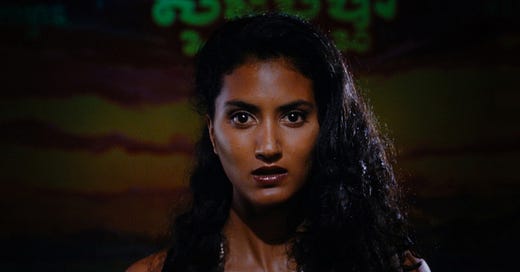I love a blip in a filmography. I love when someone makes something that doesn’t fit neatly into their oeuvre. I remember watching Todd Haynes's Dark Waters and thinking, “Damn, is my man really making a legal thriller now? Is he in his Sidney Lumet era?” Of course, you then watch the movie and come to understand just how essential it is to the body of work, even if it didn’t seem so at the outset. Dark Waters is Safe for heteros who went to Brandeis, and it’s so fucking good for it.
When I read that Chantal Akerman adapted Joseph Conrad’s first novel, Almayer’s Folly, a story about a greedy European man who has come to Malaysia in search of a fortune, I didn’t see how it would work. Would there be a mother he’s attached to? Or a pervasive anxiety that could most likely be attributed to Holocaust generational trauma? Almayer’s Folly, released in 2011, feels like some sort of colonial episode that would interest someone like Claire Denis, sinister, heavily plotted, and cynical as hell.
But to my surprise, it’s a perfect project for the Belgian master of personal crisis.
—
Conrad’s novel, published in 1895, was a contemporary account, but Akerman brings the story to the 1950s, and envisions Malaysia as a purgatory that has entrapped this ambitious man. He hunger for riches, to exploit the land and its people for his own benefit, and wanders aimlessly through a claustrophobic jungle, an environment shrouded in perpetual damp darkness. His failures are projected onto his daughter, who he’s fathered with a Malaysian wife, and he comes to see her as the new embodiment of his legacy. If it can’t be gold, it has to be his bloodline.
Akerman, in her typical patient way, spends the first quarter of the movie showing us exactly why she’s taken on this project. She’s less interested in Almayer himself, than in his mixed-race daughter Nina, who we see performing as a back-up dancer at a local bar. After the singer is stabbed, Nina stays dancing, stuck in her own sort of purgatory. Her face is inscrutable, almost zombie-like, as the director pushes in and informs the audience that this film will be, first and foremost, Nina’s recollection of her youth and pathetic father. And here we are, squarely in an Akerman movie.
It’s a radical subversion, an Akerman special, as she steals the narrative for Nina, a woman who experiences the most painful kind of alienation and sense of displacement. Akerman is often a tricky filmmaker to attach yourself to. Her movies are specific and personal, and she’s made a career confounding audiences with her in-real-time pacing. The sleepy, dream-like quality evident in her masterpieces are here too, and they are as effective in capturing the perseverance of memory in the face of an unpleasant history. Nina’s recollection of her home is incomplete, and while shot in Cambodia and not in some random studio made to look like a jungle, Almayer’s makeshift home feels small and borderless.
As a child, Nina is sent to boarding school in the city, and for a while Akerman does linger on Almayer, illuminates why he became Conrad’s focus. He’s a man plagued by his inadequacies, and like so many white men before him, he fights for control by trying to make something of the wild land around him. He’s unable to, and the director instead presents the man as a more of a fool than as an allegory for the corruption that accompanies an unquenchable desire for class mobility.
His arc becomes secondary, less interesting, when Nina returns from school, hardened by a horrible experience, where she was hazed by students and teachers alike. She’s trapped, as a woman who doesn’t fit into either world, and when she returns to her father’s encampment, the pain and anger on her face is impossible to evade. The film then becomes a tale of love and escape, as Nina falls for a military separatist who Almayer initially works with and plans to leave this land forever.
Without getting too plot, and this remains Akerman’s most traditionally plotted endeavor, the film morphs into something most fitting for the director, an act of resistance against born-into circumstance. As Nina fights for autonomy and her own spiritual growth, the movie grows intimate — she might as well be Jeanne Dielman no longer willing to be a transitory character in her own life.
—
It’s interesting to examine this film after watching Claire Denis’s Stars at Noon, an adaptation of the Denis Johnson novel. Johnson set his film at the peak of the Nicaraguan Revolution, where an American journalist (and maybe sex worker) turns to a new arrival in the hopes that he will help her leave the country for good. Denis brings it to the present, and follows the woman in a country that has been turned on its head from Covid. Stars at Noon is deliberately difficult to follow, but what it shares with Almayer’s Folly is a commitment to capturing the state of paralysis a young woman faces in an ecosystem where she has little to no agency. They are both deeply internal films, and are bold in their refusal to adhere to expected narrative constructions.
Almayer’s Folly is available to rent on Prime.





